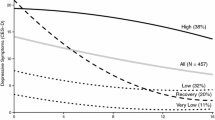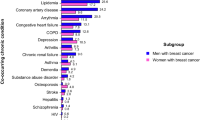Abstract
Purpose
Depression is among the most common comorbid psychiatric disorders of patients with breast cancer. Depression decreases patient quality of life and, if untreated, can adversely affect cancer treatment. We sought to identify treatment barriers for women with breast cancer receiving psychotherapy for depression. Findings may help policy makers and researchers determine funding and design of future studies involving this population, especially in communities with high rates of health disparities.
Methods
We used data from a randomized trial for women with breast cancer and current DSM-IV non-psychotic unipolar major depressive disorder (MDD). Patients were randomly assigned to 12 weeks of one of three psychotherapies and attrition was assessed by whether subjects completed 12 weekly treatment sessions. We used descriptive analyses and logistic regression to identify treatment barriers. R shiny was used to determine study patient residences.
Results
Of 134 randomized patients, 84 (62.7%) were Hispanic. Fifty-nine patients (44%) either did not start or dropped out of treatment, 49 (83.1%) of them being Hispanic. Being a Hispanic woman, less educated, and geographically distant from treatment significantly predicted attrition. Single Hispanic mothers had significantly higher attrition risk than married and/or childless women.
Conclusion
Identifying barriers to treatment is important to improve treatment adherence for patients with concurrent diagnoses of breast cancer and MDD, especially for traditionally underserved minorities. Additional support such as affordable tele-medicine, multi-language assistance, financial aid for transportation and child-care, and allocation of more funds to address some identified barriers deserve consideration to improve treatment adherence and outcomes.


Similar content being viewed by others
Data availability
Data is available upon request.
References
Bray F, Ferlay J, Soerjomataram I, Siegel RL, Torre LA, Jemal A (2018) Global cancer statistics 2018: GLOBOCAN estimates of incidence and mortality worldwide for 36 cancers in 185 countries. CA Cancer J Clin 2018(68):394–424
Fann JR, Thomas-Rich AM, Katon WJ et al (2008) Major depression after breast cancer: a review of epidemiology and treatment. Gen Hosp Psychiatry 30:112–126
Balouchi A, Hashemi S-M, Rafiemanesh H, Amirshahi M, Afsargharehbagh R (2019) Global prevalence of depression among breast cancer patients: a systematic review and meta-analysis. Breast Cancer Res Treat 2019(176):519–533
Kessler RC, Bromet EJ (2013) The epidemiology of depression across cultures. Annu Rev Public Health 34:119–138. https://doi.org/10.1146/annurev-publhealth-031912-114409
Zhu G, Li J, Li J, Wang X, Dai M, Chen J (2020) Depression and survival of breast cancer patients: a protocol for systematic review and meta-analysis. Medicine (Baltimore) 99(48):e23399. https://doi.org/10.1097/MD.0000000000023399
Wang X, Wang N, Zhong L et al (2020) Prognostic value of depression and anxiety on breast cancer recurrence and mortality: a systematic review and meta-analysis of 282,203 patients. Mol Psychiatry. https://doi.org/10.1038/s41380-020-00865-6
Bockting CL, ten Doesschate MC, Spijker J, Spinhoven P, Koeter MW, Schene AH (2008) Continuation and maintenance use of antidepressants in recurrent depression. Psychother Psychosom 77:17–26
Melartin TK, Rytsälä HJ, Leskelä US, Lestelä-Mielonen PS, Sokero TP, Isometsä ET (2005) Continuity is the main challenge in treating major depressive disorder in psychiatric care. J Clin Psychiatry 66(2):220–227. https://doi.org/10.4088/jcp.v66n0210
Melfi CA, Chawla AJ, Croghan TW, Hanna MP, Kennedy S, Sredl K (1998) The effects of adherence to antidepressant treatment guidelines on relapse and recurrence of depression. Arch Gen Psychiatry 55(12):1128–1132. https://doi.org/10.1001/archpsyc.55.12.1128
Linden W, Vodermaier A, MacKenzie R, Greig D (2012) Anxiety and depression after cancer diagnosis: prevalence rates by cancer type, gender, and age. J Affect Disord 141:343–351
Warden D, Rush AJ, Wisniewski SR, Lesser IM, Kornstein SG, Balasubramani GK, Thase ME, Preskorn SH, Nierenberg AA, Young EA, Shores-Wilson K, Trivedi MH (2009) What predicts attrition in second step medication treatments for depression? A STAR*D report. Int J Neuropsychopharmacol 2009(12):459–473
Blanco C, Markowitz JC, Hellerstein DJ, Nezu AM, Wall M, Olfson M, Chen Y, Levenson J, Onishi M, Varona C, Okuda M, Hershman DL (2019) A randomized trial of interpersonal psychotherapy, problem solving therapy, and supportive therapy for major depressive disorder in women with breast cancer. Breast Cancer Res Treat 173(2):353–364. https://doi.org/10.1007/s10549-018-4994-5
Dimidjian S, Hollon SD, Dobson KS, Schmaling KB, Kohlenberg RJ, Addis ME, Gallop R, McGlinchey JB, Markley DK, Gollan JK, Atkins DC, Dunner DL, Jacobson NS (2006) Randomized trial of behavioral activation, cognitive therapy, and antidepressant medication in the acute treatment of adults with major depression. J Consult Clin Psychol 74(4):658–670. https://doi.org/10.1037/0022-006X.74.4.658
Hopko DR, Robertson SMC, Colman L (2008) Behavioral activation therapy for depressed cancer patients: factors associated with treatment outcome and attrition. Int J Behav Consult Therapy 4:319
Vernmark K, Lenndin J, Bjärehed J, Carlsson M, Karlsson J, Oberg J, Carlbring P, Eriksson T, Andersson G (2010) Internet administered guided self-help versus individualized e-mail therapy: a randomized trial of two versions of CBT for major depression. Behav Res Ther 48(5):368–376. https://doi.org/10.1016/j.brat.2010.01.005
Applebaum AJ, Lichtenthal WG, Pessin HA, Radomski JN, Gökbayrak NS, Katz AM, Rosenfeld B, Breitbart W (2012) Factors associated with attrition from a randomized controlled trial of meaning-centered group psychotherapy for patients with advanced cancer. Psychooncology 21(11):1195–1204. https://doi.org/10.1002/pon.2013
Amsalem D, Lopez-Yianilos A, Lowell A, Pickover AM, Arnon S, Zhu X, Suarez-Jimenez B, Sanchez-Lacay A, Lazarov A, Markowitz JC, Neria Y (2022) Treatment dropout among veterans and their families: quantitative and qualitative findings. Psychol Trauma Theory Res Pract Policy 2022(14):578–586
Sánchez-Lacay JA, Lewis-Fernández R, Goetz D, Blanco C, Salmán E, Davies S, Liebowitz M (2001) Open trial of nefazodone among Hispanics with major depression: efficacy, tolerability, and adherence issues. Depress Anxiety 2001(13):118–124
Spencer M, Chen J, Gee G, Fabian C, Takeuchi D (2010) Discrimination and mental health-related service use in a national study of Asian Americans. Am J Pub Health 100(12):2410–2417
National Cancer Insitute (NCI) (2022) Cancer disparities. https://www.cancer.gov/about-cancer/understanding/disparities. Accessed on 25 Sept 2022
Hamilton M (1960) A rating scale for depression. J Neurol Neurosurg Psychiatry 23:56–62
Arnow BA, Blasey C, Manber R, Constantino MJ, Markowitz JC, Klein DN, Thase ME, Kocsis JH, Rush AJ (2007) Dropouts versus completers among chronically depressed outpatients. J Affect Disord 97(1):197–202. https://doi.org/10.1016/j.jad.2006.06.017
Markowitz JC, Milrod B, Heckman TG, Bergman M, Amsalem D, Zalman H, Ballas T, Neria Y (2021) On remote: psychotherapy at a distance. Am J Psychiatry 177:240–246
Chapoutot M, Peter-Derex L, Schoendorff B, Faivre T, Bastuji H, Putois B (2021) Telehealth-delivered CBT-I programme enhanced by acceptance and commitment therapy for insomnia and hypnotic dependence: a pilot randomized controlled trial. J Sleep Res 30(1):e13199
Murphy D, Turgoose D (2020) Evaluating an Internet-based video cognitive processing therapy intervention for veterans with PTSD: a pilot study. J Telemed Telecare 26:552–559
Maslow AH (1943) A theory of human motivation. Psychol Rev 50:370–396
Acknowledgements
We would like to thank Daniela Quigee, MS, for her assistance in preparing for this manuscript. This work has been presented at the 14th International Conference of Healthy Policy Statistics, January 2023.
Funding
The authors have not disclosed any funding.
Author information
Authors and Affiliations
Contributions
All authors whose names appear on the submission. Made substantial contributions to the conception or design of the work, or the analysis, or interpretation of data, chart and literature review, data collection. Drafted the work or revised it critically for important intellectual content. Read, commented on previous version of the manuscript, and approved the final vision to be published. Agree to be accountable for all aspects of the work in ensuring that questions related to the accuracy or integrity of any part of the work are appropriately investigated and resolved.
Corresponding author
Ethics declarations
Conflict of interest
John C. Markowitz: Reports receiving salary support from New York Psychiatric Institute; grant support from the National Institute of Mental Health, Department of Defense, and David Lynch Foundation. He receives minor book royalties for one of the study psychotherapies from American Psychiatric Publishing, Basic/Perseus Books, and Oxford University Press. David J. Hellerstein: Reports receiving salary support from New York Psychiatric Institute. He receives grant support from Compass Pathways, Relmada, Marinus, Intracellular Therapies, and Beckley Scientific, and from the National Institute of Arthritis and Musculoskeletal and Skin Diseases (M Walker PI) and serves on the scientific advisory board for Reset Pharmaceuticals. He receives book royalties from Columbia University Press and Johns Hopkins University Press. Ying Chen, Carlos Blanco, Dawn L Hershman, Joy T. Zhang have not received any competing interests. The views and opinions expressed in this report are those of the authors and should not be construed to represent the views of any of the sponsoring organizations, agencies, or the US government.
Additional information
Publisher's Note
Springer Nature remains neutral with regard to jurisdictional claims in published maps and institutional affiliations.
Supplementary Information
Below is the link to the electronic supplementary material.
Rights and permissions
About this article
Cite this article
Chen, Y., Markowitz, J.C., Blanco, C. et al. Geographical distance predicts psychiatric treatment retention for Hispanic women with comorbid major depression and breast cancer. Breast Cancer Res Treat (2024). https://doi.org/10.1007/s10549-024-07250-9
Received:
Accepted:
Published:
DOI: https://doi.org/10.1007/s10549-024-07250-9




